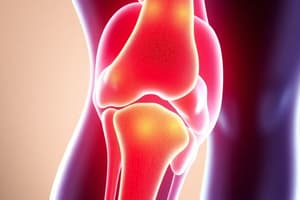Podcast
Questions and Answers
What are some common triggers for gout flares?
What are some common triggers for gout flares?
Diet, alcohol consumption, certain medications
What are some treatments for osteoarthritis?
What are some treatments for osteoarthritis?
Physical activity, weight loss, medications, physical therapy
What type of drugs are typically used in the treatment of rheumatoid arthritis?
What type of drugs are typically used in the treatment of rheumatoid arthritis?
Disease-modifying antirheumatic drugs (DMARDs), nonsteroidal anti-inflammatory drugs (NSAIDs), biologics
What type of exercise may be beneficial in managing rheumatoid arthritis?
What type of exercise may be beneficial in managing rheumatoid arthritis?
How can gout be managed?
How can gout be managed?
Flashcards are hidden until you start studying
Study Notes
Joint Disease: Osteoarthritis, Rheumatoid Arthritis, and Gout
Joint diseases refer to a range of conditions that affect the health and function of a joint. These diseases involve issues with the joints, bones, tendons, ligaments, cartilage, and surrounding muscles. They can cause pain, swelling, and reduced range of motion. Some common joint diseases include osteoarthritis, gout, and rheumatoid arthritis.
Osteoarthritis (OA)
Osteoarthritis is a degenerative joint disease that involves a slow breakdown of cartilage within a joint, causing pain, inflammation, swelling, and reduced range of motion around a joint. It is the most common form of joint disease and can affect any joint in the body, with the knees and hips being the most commonly affected. Osteoarthritis is more common in older adults and can be exacerbated by factors such as obesity, joint injuries, and genetics.
Rheumatoid Arthritis (RA)
Rheumatoid arthritis is an autoimmune condition that can affect multiple joints and cause pain, swelling, and inflammation. It typically affects the joints in a symmetrical pattern, meaning the left and right joints are affected similarly. Rheumatoid arthritis can also cause systemic symptoms such as fatigue, low-grade fever, and weight loss.
Gout
Gout is a form of inflammatory arthritis that occurs from a buildup of uric acid crystals around joints, causing pain and inflammation. Gout flares can last from a few days to several weeks and can be triggered by factors such as diet, alcohol consumption, and certain medications.
Treatments and Therapies
Treatments for joint diseases vary depending on the specific condition and its severity. For osteoarthritis, treatments may include physical activity, weight loss, medications, and physical therapy. For gout, treatment may include dietary and lifestyle changes, medications, and addressing any underlying health conditions. Rheumatoid arthritis treatment typically involves disease-modifying antirheumatic drugs (DMARDs), nonsteroidal anti-inflammatory drugs (NSAIDs), and biologics. Low-impact exercise and strength training may also be helpful in managing rheumatoid arthritis.
Related Topics
Joint diseases can also be caused by infections, such as tuberculosis and brucellosis, or viral infections like rubella. Infections can affect one joint (monarthritis) or a few joints (oligoarthritis). Treatment for infectious arthritis typically involves antibiotics and antituberculous medications for tuberculosis infections.
Studying That Suits You
Use AI to generate personalized quizzes and flashcards to suit your learning preferences.




